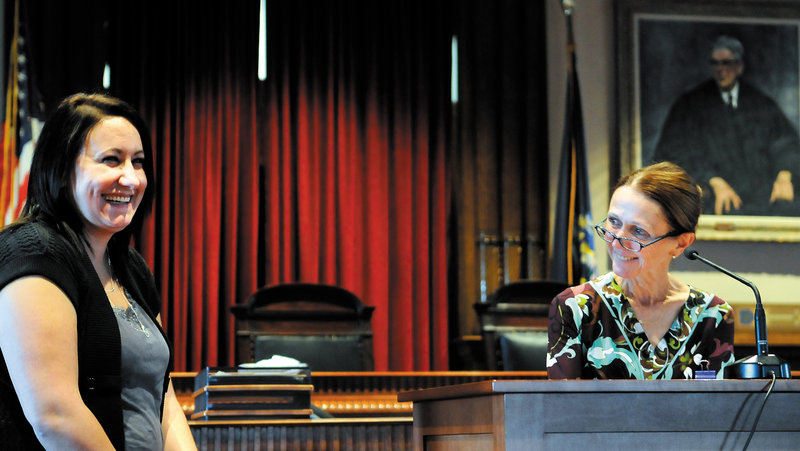AUGUSTA – Most defendants in court don’t get to hug the judge.
But such rejoicing was the order of the day recently when seven former defendants with mental illness and substance abuse problems graduated from a special court program designed to help them succeed in life and avoid further criminal trouble.
“The time has come for rehabilitation to transcend punishment,” Justice Nancy Mills told them and more than 100 people gathered to recognize their achievement last week.
The graduates and a handful of others won hugs from Mills, who wore a print dress for the festive occasion rather than the traditional black judicial robe.
Nichole Rogers, 30, formerly of North Anson and now of Augusta, won a big round of applause and a special “Congratulations, girlfriend!” from Mills.
Rogers described herself as “a woman 2½ years in recovery” who at one time “couldn’t remain sober for 24 hours to enter a detox program.”
She said the road to self-destruction began when she was 17. She went to a doctor for pain management and ended up addicted to Oxycontin. The addiction drove her to crime, and she was convicted of burglary and violated probation five times.
“I was powerless,” she said. “My morals and values slowly diminished.”
Mills met Rogers at the Somerset County jail when Rogers first entered the specialty court program, known formally as the Co-Occurring Disorders Court.
By then Rogers had been divorced and evicted and her car had been repossessed, so she had no transportation to get to the court program, which holds mandatory Monday meetings.
The court is essentially a team of social service providers connecting participants with housing, medication and other treatment, including an intensive outpatient program and a program of behavioral therapy. The goal is to reduce punishment and increase development of skills for participants to function better in society, including regulating emotions and tolerating stressful situations.
Applicants are screened to ensure they fit the court’s criteria, and part of the regimen includes meeting every Monday with the judge.
In order to enter the special court program, the defendants plead guilty to the criminal charges or admit to violating probation and receive two sentences — a best-case scenario with a shorter jail term, and a worst-case scenario, which carries a longer sentence.
“We require these defendants to take responsibility for their conduct,” Mills said.
Rogers was admitted to the court in June 11, 2009. Her best-case scenario was to be sentenced to 36 days she had already served; the worst case sentence was a full revocation: 1,334 days in jail, according to court records.
Rogers had been sentenced in October 2008 on a burglary charge to four years in jail with all but 30 days suspended and two years’ probation.
For Christmas 2009, Rogers had no presents for her children. Mills told her to focus on planning for a better holiday the next year.
Rogers spent almost two years in the program because of her bad behavior in the beginning, which cost her an additional two months in jail for violating probation.
“Life with Nichole was not a bowl of cherries,” Mills said.
Rogers then decided to reform. “I let my kids live with my husband full time and moved to a shelter,” she said. “I did everything (the judge and the case managers) told me.”
When she graduated last week, Rogers thanked everyone for the support.
“I know for sure I never, never, never could have done this alone,” she said to applause from the audience.
After watching her graduation, her parents, Ed and Darcia Duguay of North Anson, were full of praise for their daughter’s success in overcoming her addiction and for the special court program.
“I used to go to bed every night believing she wouldn’t be here in the morning,” Darcia Duguay said. “We love her.”
This was the fifth graduating class — and the largest — since the program began in 2005.
Demand for it is high. Mills said the program received 458 referrals; only 80 people have been admitted.
The seven graduates, Mills said, faced a total of 277 months in jail if they had failed. By succeeding, they served only one-tenth of that time.
“We are giving these clients the resources and tools they need to lead a happy, productive life,” she said.
Kennebec Journal Staff Writer Betty Adams can be contacted at 621-5631 or at:
badams@centralmaine.com
Send questions/comments to the editors.



Success. Please wait for the page to reload. If the page does not reload within 5 seconds, please refresh the page.
Enter your email and password to access comments.
Hi, to comment on stories you must . This profile is in addition to your subscription and website login.
Already have a commenting profile? .
Invalid username/password.
Please check your email to confirm and complete your registration.
Only subscribers are eligible to post comments. Please subscribe or login first for digital access. Here’s why.
Use the form below to reset your password. When you've submitted your account email, we will send an email with a reset code.